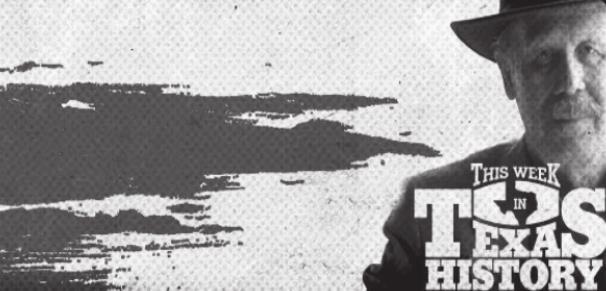On Feb. 22, 1878, Sam Bass and his gang pulled the first train robbery in Texas history hitting the Texas Central at Allen Station 24 miles north of Dallas.
Fed up with the daily drudgery on his uncle’s Indiana farm, young Sam Bass headed southwest in 1869 to make his cowboy dream come true. Hired by a rancher outside Denton, the likable youth was a steady hand for several years.
However, by 1874 Bass had fallen in with a bad crowd. In cahoots with a local character, whose claim to fame was a church burning, he got his first taste of easy money by tricking gullible bettors into wagering against a sluggish mare. The crack of a pistol shot transformed the ringer into a racing demon that could outrun anything on four legs.
After the collapse of a cattle scheme six months later, Bass and new buddy Joel Collins were stranded in South Dakota. Flat broke and thousands of dollars in debt to Texas investors, they resorted to sticking up stagecoaches with three indigenous ne’er-do-wells.
On Sep. 18, 1877, Bass and his associates surprised a train stopped for water near Ogallala, Nebraska and carted off $60,000 in freshly minted twenty-dollar gold pieces. The outlaws quickly divvied up the loot and parted company with the two Texans anxious to put the Red River between them and their pursuers.
Eight days later, federal cavalry cornered three of the fugitives and killed them when they refused to surrender. Bass and Collins were better at dodging army patrols in the Oklahoma Territory and eventually reached Lone Star sanctuary.
By December, Collins was six feet under and Bass was busted again. He recruited old acquaintances from Denton for a North Texas crime spree which included, for an apparent change of pace, the holdup of the Fort Worth-Weatherford stage.
The train robbery went so well at Allen Station in February 1878 Bass decided to try it again two months later at Mesquite. But the botched attempted ended in a wild shoot-out provoking a public outcry for a crackdown.
During the manhunt, Rangers arrested Jim Murphy for harboring the wanted men. In exchange for his freedom, he offered to infiltrate the gang and to arrange their capture. Frustrated by the fruitless search, Major John B. Jones cut the distasteful deal. While passing through Belton on Jul. 13, the undercover informant slipped into the post office and frantically scribbled a note to Ranger headquarters in Austin. “We are on our way to Round Rock to rob the bank,” Murphy wrote. “For God’s sake be there to prevent it.”
Bass had never robbed a bank, especially in broad daylight, and thought it wise to take one last look the day before the caper. Accompanied by Frank Jackson, Seaborn Barnes and the traitorous Murphy, he quietly rode into Round Rock on Jul. 19. Major Jones and three other Texas Rangers were scattered around town and did not immediately catch sight of the quartet. Murphy separated from his unsuspecting comrades, who casually strolled into the general store next to the bank.
Ignoring Major Jones’ instructions to give the bandits a wide berth, Deputy Sheriffs Ellis Grimes and Morris Moore foolishly followed the trio inside. Grimes tapped Barnes on the shoulder and inquired if he was carrying a concealed weapon in violation of the community’s gun-control ordinance.
Barnes spun around and took the deputy’s life with a single squeeze of the trigger. A second shot knocked his partner out of commission, but he lived to tell about his near-fatal run-in with the Bass Gang. The state lawmen and a number of publicspirited citizens were armed and ready, when the outlaws came out the door. Ranger Dick Ware, who did not pause to wipe the barber’s lather from his beard, drew a bead on Barnes and killed him instantly with a bullet in the head.
Bass and Jackson reached their horses but had to ride through a gauntlet of gunfire to make good their escape. Ranger George Harrell fired as the pair went by, and his slug struck Bass in the back exiting near the navel.
He fell out of the saddle a hundred yards down the street, but Jackson risked almost certain death to rescue him. Calmly returning fire with one hand, he helped his brother bandit onto his horse with the other and they disappeared in the dust.
Bass knew he was done for and that night persuaded Jackson to go on alone. He reluctantly complied and rode away never to be heard from again.
The Rangers found the mortally wounded Bass the next morning and carried him back to Round Rock. He saw one more sunrise before dying on his twenty-first birthday.
As gunfighters go, the personable Midwesterner was small potatoes compared to the likes of John Wesley Hardin, Bill Longley and Ben Thompson. In fact, he was never even accused of murder. But years of persistent promotion turned Sam Bass into a frontier legend.


